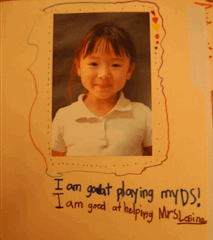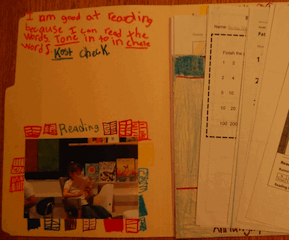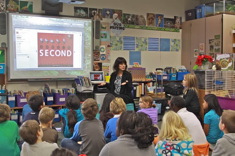Parent conferences are a time of preparing, collecting, analyzing, scheduling, and sharing. This fall we asked Choice Literacy contributors to share some of their best tips and reminders for conferring with families. This article is the first in a two-part series.
Beth Lawson, Grade 4 Teacher and Choice Literacy Contributor
Over the years I have found that student-led conferences are one of the most powerful ways to connect with families and students. Through trial and error I have realized that students need effective tools to help them be successful in theseconferences.

One of the tools we developed last year in our second grade classroom, was a reflection portfolio. The reflection portfolio held work samples (both student and teacher selected) and assessments. It also held photos of student work in action. Each side of the folder was dedicated to a different subject area. There was a photo of the student hard at work in that subject area. The second graders then wrote a brief reflection about the strategies they were working on in that specific area (reading, writing, math and learning behaviors). At our conferences students were able to use the photographs and reflective writing to communicate the work they were doing at school with their families. The photos were a big hit and really helped families seetheir children as readers, writers and mathematicians.

Heather Rader, Instructional Specialist and Choice Literacy Senior Editor
Not all family members attending conferences have happy memories of school so the conferring environment was one of my considerations. With soft classical music playing, grapes to offer and a toy corner set up for little ones, I anticipated what might make it the most comfortable experience possible. Also I knew families would be spending a little time in the hallway between conferences so I set up a desk with art supplies to entertain my students and their siblings. When I posted the schedule I would use alliteration to add pizazz to the list.
Monday might read:
12:30 Dynamite Damian
12:50 Marvelous Maria
1:10 Jovial Jovanna
1:30 eXcellent Xander . . . and so on.
For many it became the ice-breaker as parents would say, “I can’t wait to hear all about Dynamite Damian.”
Aimee Buckner, Author of Notebook Know-How and Notebook Connections
As a parent, I’ve been in conferences where the teacher showed me volumes of my son’s work as she talked about his progress. Those conferences always lasted longer than the allotted time. Then I’ve been in conferences where it seemed the teacher had prepared nothing, and when I asked questions, she spent time looking for the information. I try to find a nice balance.
Now I make copies of every work sample I want in the portfolio. I then send home the original. I also have weekends where kids bring home a notebook from a specific subject to show their parents the work we’re doing. This helps the parent know what’s going on so the only pieces they haven’t seen are the recent ones.
During the conference, I always start with something positive about the child. I have the parent conference form – with any questions or concerns they’ve indicated – and I address those first. Then I give them an update on their child’s progress and my plans and/or goals for the child over the next few weeks. As a parent, I want to know that the teacher has a vision for my child. It doesn’t matter to me what the ‘class’ is doing, it matters what my child is doing and what the next step is for him/her.
I wrap up the conference with what I need from the parents. So I might say, “In order to accomplish these goals, I need your help. I’d like you to. . .
continue the support you’re already giving at home.
review math facts with your child for five minutes each night.
establish a homework time for your child and let him/her know when s/he has time for homework each day.
ask your child some questions about what s/he is reading.
encourage your child to do the extra credit.
By asking for help with a specific and doable suggestion, I partner with families to strengthen the home-school connection.
I’d also like to add a note about divorced parents. I know teachers have a lot of conferences to do in a short period of time. Over and over I hear teachers complaining about divorced parents who want separate conference times. As a parent who is divorced, I have an inside look at why it’s important to offer separate times. Divorce is hard. It’s really hard. And it’s emotional for the parents who feel like they’ve lost control of their own lives and don’t want to lose out on their kids’ lives. There is a lot of hurt and pain during the first few years (at least) of a divorce. Children add depth and complexity to all of these feelings. It’s helpful for parents to be able to focus just on their child during a conference. By honoring two separate conferences, you are giving a great gift to your student. It’s a gift of your time and expertise to the child and his/her parents, and the payoff will be worth it. Plus, you’ll control the information that’s given to each parent and how it’s given. So there won’t be any ‘interpretation’ of what the teacher said.
Trish Prentice, Kindergarten Teacher and Choice Literacy Contributor
Teachers organize, plan, welcome, smile, instruct, discipline, counsel, and give hugs. Our busy lives are filled with unending meetings and multitudes of emails. Parent conferences add another layer of effort to an already crowded schedule. For years, my goal has been to pack all my conferences into one day. I enjoy talking with parents, so I begin at 7AM and end at 7PM. It’s a full day marathon, but then I’m DONE. This year, to my irritation, a parent forgot to come! How is that possible? He only has one child in school, I have a roomful and I was there. Grudgingly, I rescheduled for another day. Of course, it had to be Friday afternoon at 5:00. As we sat together, he told me in his broken English, that he is a “single dad” for now. His wife is working in another state and only able to come home occasionally on weekends. Plus, there is another child at home who is ten months younger than his kindergarten daughter in my class. Dad admitted that he is finding it difficult to balance the demands of his job with the stress of being a good parent. Suddenly I was humbled. Here’s someone trying to do it all; the least I can do is listen. We had a lovely conference as I gained insight into how I can help his daughter. I was able to give him a few suggestions on what he can do to assist her at home. The whole experience slowed me down. After all, it’s not about checking conferences off my “to do” list. It’s about making a connection with families . . . now that’s a great use of time!





